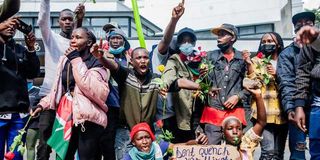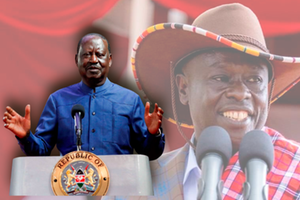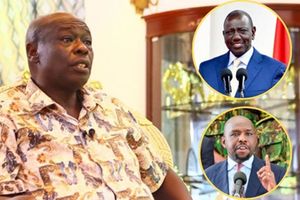
Protesters picketing along Kimathi Street in Nairobi during the commemoration of the Gen-Z protests on June 2, 2025.
“This is not our war”. In the days leading to the June 25 Gen Z demonstrations, this declaration became a top trending subject of debate on social media and some WhatsApp groups, fronted by some perceived supporters of ODM and Raila Odinga from his Nyanza bastion.
It was a caution of sorts that the looming protests, which eventually took place on Wednesday in at least 25 counties, was something ODM followers should never take part in, because it was allegedly being sponsored by forces that have always opposed the advancement of people from Nyanza region. Mr Odinga and his party are in the so-called broad-based government arrangement with President William Ruto’s Kenya Kwanza administration.
Those in this school of thought were crowing that with non-involvement of Mr Odinga, the ODM leader — believed by some to be the one with the control levers of the most potent demonstrations in recent years — his supporters should not only keep off but the chances of the protests succeeding had also diminished.
The debate was also linked to the stereotype, which has for years been a political talking point, that Mr Odinga’s hard-core supporters had been weaponised as expert demonstrators while others from opposing camps were busy in economically gainful activities. Phrases like watu wa kung’oa reli (those who uproot railway lines) or “watu wa kutupa mawe (stone-throwers) have been part of the political lexicon whenever critics wanted to discredit Mr Odinga and his supporters.

Youths take part at the Uhuru Park grounds in Nairobi County on Sunday, July 7, 2024 during the Gen Z Memorial concert honour of those killed during anti-tax protests over the last three weeks. DENNIS ONSONGO|NATION
Bloggers linked to the Ruto and Raila camps were the leading proponents of this stance, although at the end of the day they brought in many to their side and stirred debate that supporting the demonstrations would mean backing former deputy resident Rigathi Gachagua and his Mt Kenya stronghold. Mr Gachagua has since denied playing any role in the youth-led protests.
Diametrically opposed to this line of thinking was another group that believed the grievances that made Gen Z take to the streets were universal in the Kenyan context and that Mr Odinga’s supporters, especially from his Nyanza stronghold, were equally affected by the failures of the government, just like any other Kenyan. But some critics of the bloggers that were pushing the narrative feel that the drive to position Gen Z demos into the ethnic rivalry mould in a campaign to discredit them was dangerous.
Despite many acknowledging that since last June the mobilisation for the protests has mostly involved young people on social media — who style themselves as leaderless, partyless and tribeless — the state-leaning bloggers talked of a sinister plot involving politicians, civil society activists, billionaires and the media.
However, political commentator Frederick Mwalo says this-is-not-our-war brigade is wrong. “I see no sense in this slogan. Why has it stopped being our fight? Surely not because we (ODM supporters) got two Cabinet slots in the government.”
Meaningful employment
He added: “Is the economy performing better? Are our children guaranteed meaningful employment? Are we now past electoral injustices? Are we no longer victims of police brutality and extra judicial killings? I have always believed that the fight was and is about the country and not about a few individuals. The fact that a few individuals from my community have been incorporated into the government does not mean that everything is automatically fine. The fight is about conviction, not convenience. What and who was the motivation behind it? The slogan is being peddled and promoted by politicians who want to be allowed time to eat and plunder in peace.”
But gender activist and ODM member Lizzy Yogo, is one of the staunch supporters of the view that there was a narrow political agenda in the protests and it was sensible to keep off. She says that for a long time Mr Odinga’s base has been in the trenches fighting for a better Kenya, getting a kick in the teeth without as much as a “thank you.”

Protesters picketing along Moi Avenue in Nairobi during the commemoration of the Gen-Z protests on June 25, 2025.
“We have carried the burdens of this country for a very long time yet we have continued being marginalised. Every time we took to the streets to demonstrate agitating for better governance we were called names that we are anti-business. Now that Raila is engaging Ruto some people are not happy and want us to join them but we are saying no,” she says.
As it were, the demonstrations came and according to those who supported it, it was successful. Apart from the huge crowds it commanded, the Wednesday Gen Z demos did not dampen the debate on the politics of protests. While it largely celebrated how the youth-led protests had debunked the ethnic stereotypes that had accompanied previous protests and proved success was possible without the say-so of big political names, others still chose a regional lens and declared the end of Mr Odinga’s control of the streets.
“Karatina has become the new Kisumu,” enthused one Facebook user. This was in reference to the fact that whereas Kisumu, and most of Nyanza, remained largely quiet on Wednesday, Central Kenya was rocked by violent demonstrations, destruction, death and looting. It is similar events over the years that have been used as a political stick to beat Mr Odinga as the master of chaos.

As Gen Zs marks the anniversary of their June 2024 protests, the nation must reckon with what has and hasn't changed.
Another social media user was even more blunt saying that Kenyans from now henceforth would go to the streets to demand their rights without the input of Mr Odinga’s base.
Political rivals
Herein lies the problem, according to M Mwalo. “The perception in the country is that the people of Nyanza are on the wrong side of history. Our few politicians want us to believe that we are profiting immensely from their being in government. Our political rivals seek to isolate us and gather their masses by making the nation believe that we have abandoned the struggle. There are more people from Mt Kenya in Cabinet than there are from Nyanza, but we are the ones seemingly on the wrong side of history.”
He added that the ordinary citizen from Nyanza, whether or not a supporter of Mr Odinga, is still suffering just as much as any other Kenyan. “Many young people from the region have died during these demonstrations. Guns have no way of identifying which tribe one comes from. Raila's role as the one who can control demos seems to have been dented,” he said.
But Ms Yogo, the staunch ODM supporter, sees it differently. “We have seen the benefits of working with President Ruto. Projects are being unveiled, roads and being built and our people are getting jobs. If we are on the wrong side of history because of such, so let us be.”
However, she points out that working with Dr Ruto might turn out to be a double-edged sword for Mr Odinga, at least if some commentators are to be believed. Speaking in Kilifi at a function where the President was present, Mr Odinga told off those he claimed wanted to remove Dr Ruto from power, saying that such a mission could only be accomplished at the ballot box. While affirming the right to peaceful protests, he also condemned violence during such demonstrations.
Ms Yogo says Kenyans will readily forget Dr Ruto’s alleged misdeeds just as they did with Uhuru Kenyatta, who she claims despite messing up the economy by borrowing with wanton abandon, still went ahead to be given him a second term.
Mr Mwalo says many of Mr Odinga’s supporters across the country, and not just in his Nyanza base, are uncomfortable with the direction the country is taking. He cited corruption, abductions, extrajudicial killings and economic hardships among others.
“These are things Raila has always spoken out against. But how can we speak out against these and still continue to enjoy the presumed benefits of being part of Ruto’s government?” he says.
The analyst thinks Mr Odinga and hi score supporters have lost credibility to a certain extent.
“Now when Raila speaks against extra judicial killings or in support of maandamano, there’s always a sense of scepticism. It comes across more as a PR (public relations) stunt, than conviction,” he says.
There have also been fears from some quarters that Dr Ruto could easily ditch Mr Odinga because the main reason the ODM leader was co-opted into the Kenya Kwanza administration was because of his ability to pacify the country.
But with the inherent ability to reinvent himself each time he is written off politically, it remains to be seen what card the ODM leader will pull out of his back of tricks.






